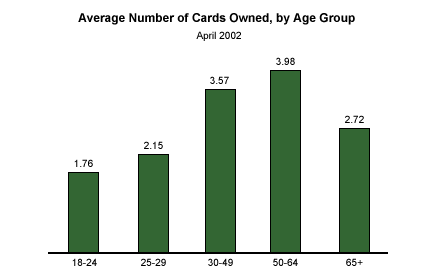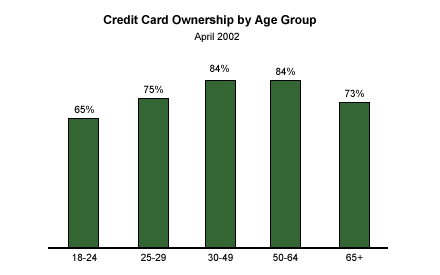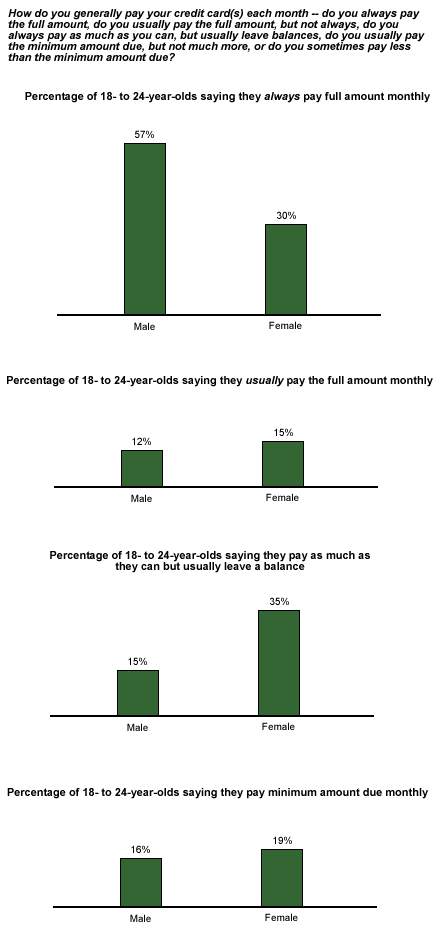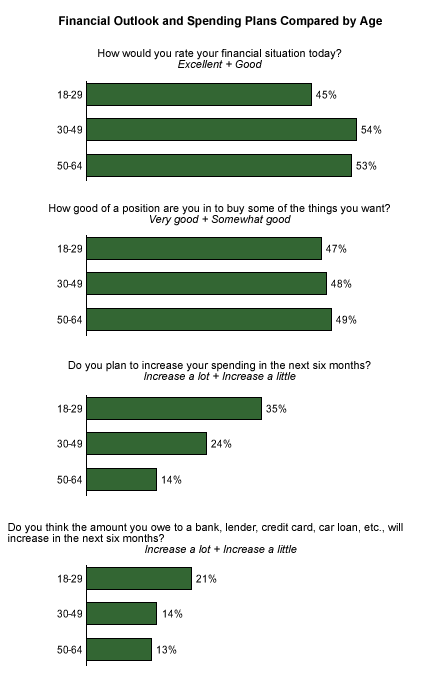Although most 18- to 24-year-olds can't yet ante up for big-ticket items like houses, sport utility vehicles, and swimming pools, this group is still among the most prized consumer demographics on the planet. Their enthusiasm for spending may be second to none, especially when it comes to goods like CDs, clothes, beer, cell phones and pizza. It's no surprise that the credit card industry has been aggressively wooing them for years -- on college campuses, and even while they're still in high school.
Given that anyone 18 and older can now own a credit card, without a co-signer and regardless of ability to repay, Gallup explored the issue of whether young adults may be on credit overload. But the 18 to 24 age group, in fact, remains the least likely to own a credit card, and also still tends to have fewer credit cards on average than any other group*.

Although limited-amount credit cards can be excellent tools for training young people to be financially independent, there are many reasons for those who are just starting out to show restraint. The obvious temptation that comes from having a credit card in your pocket can put financially inexperienced young adults in debt quickly and burden them with bad credit ratings that may take years to resolve. Thus, debit cards that deduct money directly from one's bank account have recently become far more popular among young people than traditional credit cards. According to a 2001 survey by the New Jersey-based Student Monitor LLC, college students alone are twice as likely to own a debit card now as five years ago. In 1997 debit card ownership was a mere 30% -- by 2001 it had risen to 57%.

The stereotype that women tend to be more avid shoppers than men is borne out in the fact that 18- to 24-year-old women are much more likely than men in that age bracket to own a credit card, by a 71% to 60% margin. In the other age groups, men are more likely or about as likely to have credit cards. There aren't any significant differences in the average number of credit cards younger men and women hold, although young women are shopping more and paying back less. Among nearly every age group, men are more likely than women to say they always pay the full amount on their credit cards. The difference is especially pronounced among 18- to 24-year-olds.
To help develop lifelong financial skills among young women, Smith College in Massachusetts initiated the first financial education program for undergraduates last year. Not satisfied to educate just their own students, Smith has instituted the Center for Women's Financial Education with seed money from Goldman Sachs. Smith hopes to develop a model program for other colleges and universities in which young women can get on the right track to financial management early in life.

The need for such programs clearly exists. In a survey conducted in July**, Gallup broadened the youngest age bracket to 18- to 29- year-olds, allowing for the inclusion of those who have already graduated from college and started their careers. The results indicated that fewer young adults in this group (45%) rate their financial situation as excellent or good than do 30- to 49-year-olds (54%) or 50- to 64-year-olds (53%). But those young adults are much more likely than older adults to say they plan to increase their spending in the next six months (35% for ages 18 to 29, 24% for ages 30 to 49, 14% for ages 50 to 64).

Key Points
Even with easy access to credit cards, vigilant young consumers haven't flocked to fill their wallets with them. Among those 18- to 24-year-olds who have credit cards, most -- but not all -- treat them with utmost respect. Particularly vulnerable to fiscal woes are those who do not learn financial responsibility before leaving home. Young adults are naturally optimistic about their financial futures, but seem to understand the need to be cautious about spending and piling up debt until they have established good credit ratings -- particularly since they will need those good ratings when it comes time to buy their limos, mansions and yachts.
*Results are based on telephone interviews with approximately 1,000 national adults, aged 18 and older, conducted April 6-8, 2001 and April 8-11, 2002. For results based on the total sample of national adults, one can say with 95% confidence that the maximum margin of sampling error is ±3%.
**Results are based on telephone interviews with 1,004 national adults, aged 18 and older, conducted June 9-11, 2002. For results based on the total sample of national adults, one can say with 95% confidence that the maximum margin of sampling error is ±3%.